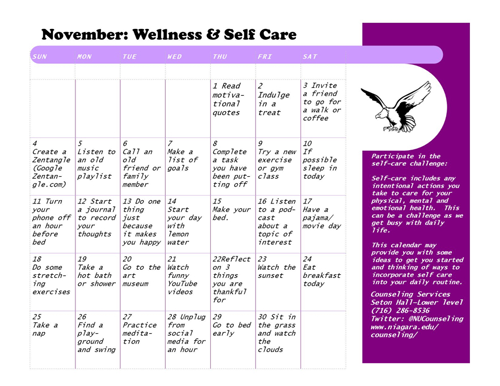In addition to working toward good grades, students need to keep their mental health and wellness at the top of their priority list
Tips on managing stress in healthy ways
By Michaela Scofero
Special to Niagara Frontier Publications
As the fall semester dwindles down to an end, students are preparing for final projects, papers, and cramming to study for final exams. Finals week is often a bittersweet time for students, though many are excited for the upcoming monthlong break. Exams can take a toll on one's mind.
College students work hard throughout the entirety of the semester, but, when finals week rolls around, it is important they take care of themselves. Students can't pour from an empty glass. Through countless research, there is evidence of good stress. But, where is the line drawn between healthy and unhealthy mental stress? And importantly, what can students do to stay in a healthy state of mind as the semester comes to a close?
College is an exciting time in a young adult's life. There is so much going on that it is easy to become overwhelmed and endure unhealthy stress, which is usually accompanied with unhealthy coping mechanisms. Between attending classes, studying, socializing, extra-curricular activities, sports, working a part-time job, and making time to see family and friends, it can become hard to manage time and keep a list of top priorities.
Following and keeping track of upcoming assignments, blocking out time and organizing ahead of time is an effective way to reduce stress and panic.
Taking breaks is equally important as working hard. When an assignment is becoming overwhelming and difficult, step away to get a clear mind. Return to the assignment with a fresh mind to reduce frustration.
Breaks are important, but different from procrastination - don't do it! Though many students have probably claimed that procrastinating helps them do better work, it probably won't do anything to help one's mental health. Making sure students give themselves plenty of time to prepare for assignments and exams beforehand will help eliminate the last-minute panic when the realization of forgotten assignments hit.
"After my freshman year, I realized how important it was to learn time management. Now, I make sure I write everything down. I usually take about an hour at the beginning of every week to organize my classes it helps so much," said Bryce, a senior at Niagara University.
After an interview, he gave advice to incoming college students, Bryce laughed when he said, "Buy a planner and use it. Oh, and actually keep track of your syllabus!"
According to an article from
VeryWellMind.com, sources of good stress come from excitement and actually
wanting to do certain tasks and activities. Additionally, goal setting is a great source of healthy stress. For students, keeping their eye on the prize of a diploma (and graduation) is certainly the motivational push they need. Keeping in mind the end-goal and holding onto determination to do well is important for students to remind themselves when pushing onward.
Caffeine and college historically go hand-in-hand, as sometimes it's the only thing students claim keeping them afloat after a late-night study session. But, caffeine can actually become ill-effective if one consumes too much.
"Small to moderate amounts of caffeine can lift your mood and give you a boost" said Elizabeth Scott, a wellness coach specializing in stress management and quality-of-life issues. Scott advises students to keep caffeine levels to a minimum, as caffeine elevates cortisol levels, leading to negative side effects. To summarize Scott's tips, the author advises not to have too much caffeine (none after 2 p.m.), and don't forget to incorporate healthy exercise!
Since grade school, students have been told fueling the body and mind the morning before a big exam is key. This can also apply to study-snacks, as well. Before reaching for the chips or easy mac 'n cheese, consider opting for fruit or veggies - and don't forget to keep hydrated! It is easy for students to mindlessly eat unhealthy snacks during study sessions, or some students forget to eat at all.
"GoodLuckExams" breaks down test/studying nutrition for readers step-by-step with these
tips.Many colleges, including Niagara University, offer students resources to help during this busy time of year. Niagara's Office of Campus Activities is sure to let students know what's happening around campus through its active Twitter account (
@NUCampusAct). NU's Campus of Activities offers students what they call, "Study 'n Chill," a health and wellness program during finals week. It is held at the Castellani Art Museum on campus. The event includes free coffee, hot cocoa and tea, adult coloring, relaxing music, study zones, and yoga for students.
"I usually try to attend the Study 'n Chill sessions every semester. Friends and I go together to get our minds off the madness," said a senior at Niagara University. "I'm minoring in writing, so, when I have writer's block, I seriously need to take a break or else I'd get nothing done without going insane. My favorite thing to do is take a Starbucks break. It gets me off of campus and out of the library."
Niagara University is sure to provide a variety of resources to its students. Available on Niagara's website is, "Helpful Steps to De-Stress," which lists tips to help keep stress levels to a minimum, such as working out, making lists and taking breaks.
Niagara also offers free study and reading strategies and skills. Offering accessible 24/7 textbook help, time management skills, self-management, test taking advice and services, and how to take effective notes to name a few.
All general study skills can be found on NU's website
here.During midterm and finals week, Niagara University also typically offers students the opportunity to visit therapy dogs, which are located on the second floor library. That's certainly a wonderful reason to take a study break.
(Photo: Calendar from the @NUCounseling Twitter account. November's self-care challenge for students)
For students who may be feeling a little too overwhelmed with the end of the semester or need help adjusting and managing college or any personal-life problems, Niagara University's Counseling Services is there to provide further support and compassion for students and their situations.
"I started to take advantage of the counseling here my sophomore year. I was struggling with a lot of family stuff and didn't want to bother my friends about it all the time, so I needed someone to talk to," an NU senior said. "It's uncomfortable at first, but the counselor I was working with was so nice. I'm really thankful they offer this to students."
For more information, students are encouraged to call the counseling staff at 716-286-8536, visit them
here or stop by the office located in Seton Hall (lower level).
•••••
Niagara Frontier Publications works with the Niagara University Communication Studies Department to publish the capstone work of students in CMS 120A-B.
These articles do not necessarily reflect the opinions or beliefs of NFP, NU or the communication studies department.
Comments can be sent to the NFP editorial department, care of the managing editor.































